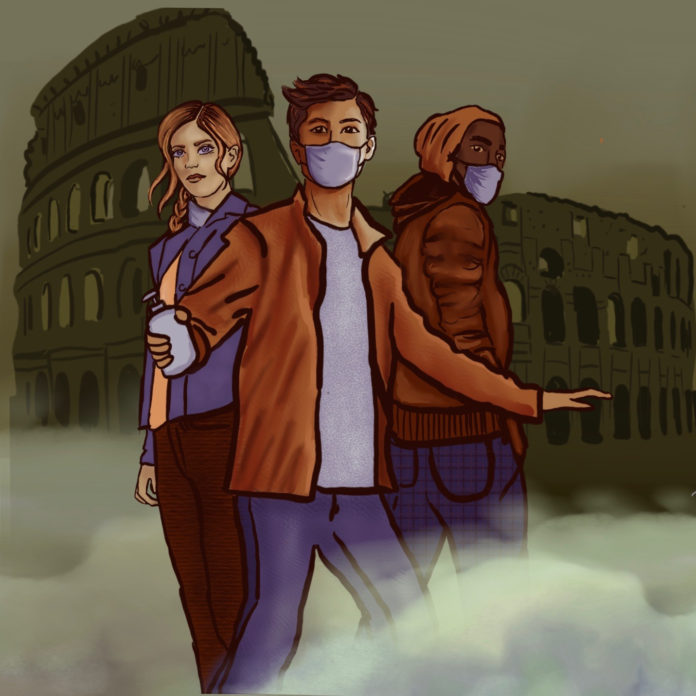While I was studying abroad in Rome, Italy, an IES Abroad Rome administrator emailed all its participants Feb. 24 stating that we would have online classes until March 13. In response, my roommates and I clinked our glasses to the so-called “quarantine” and chased each other around, joking that one of us was going to get the “corona touch.”
I wish I could joke that the email commenced the most strenuous two weeks of our entire lives.
We were in the Fyre Fest of study abroad programs. Every day, I would look at my email and find a dumpster fire. Field studies: canceled. Center for Disease Control and Prevention (CDC) levels: increased from two to three. COVID-19: alive and spreading rapidly. Despite the chaos, I wanted to stay. Online classes were worth the view of the rust-colored buildings from my balcony, the three-minute walk to the Pantheon and the home-cooked Italian meals from our Italian Student Companions (ISCs). Rome was more than my study abroad experience — it was my home.
Italy now has the highest number of confirmed deaths from COVID-19. Italy’s downfall felt as if I was watching a relative develop an acute illness, but there was no sympathy from colleges, government officials or media sources —only fear disguised in apathy. The hysteria from the coronavirus plagued my study abroad experience because people failed to recognize the tangible impact of fear-mongering language on everyday people within Italy, and now worldwide.
After IES’ initial email, many universities mandated students to come home, including my best friend from home. Her university, along with many others, sent emails forcing their students to leave within that same week. Luckily, Oxy’s International Programs Office (IPO) gave me the option to stay through a waiver. Oxy was one of the only colleges on the program that provided this option, and I was happy to sign my life away if it meant I could stay in Italy instead of “studying abroad” in my small New York City bedroom. However, many universities also refused to reimburse their students for their last-minute flights home. In an email sent to study abroad students March 18, IPO said they are still deliberating about how it’s going to allocate its funds toward study abroad reimbursements.
Students worked incredibly hard to get to Rome through an intense visa process, permission to stay and school-by-school application process. But the aloof response by many universities seemed like they were trying to save face rather than protect their students. Some offered students the option for students to return to Italy at a later date to finish the semester if conditions improved, while other universities threatened to unenroll their students if the students didn’t promptly return to the U.S. I constantly feared that my friends and roommates would be pulled from the program, disrupting my last few weeks abroad.
At the same time, the unpredictability of U.S. and Italian government decisions regarding COVID-19 made me and my friends value the time that we still had in Rome. We started to appreciate how empty the city was. Compared to the usual two-hour wait, my friends and I waited five minutes to get into the Vatican Museum.
All of the museums closed March 9. At the time, I didn’t think this was the right decision because I was in Rome specifically for its museums.
Then, there were less than 30 students left in my program. The domino effect of study abroad students leaving and tourists avoiding Rome like the plague devastated local businesses. There was this small woman-owned boutique that I walked by throughout the semester. When I decided to go my last week in Rome, the owner had to forage through her own wallet to find enough change to give me. She told me that she had seen one other customer that day when there were usually hundreds who’d stop by after a long day of sightseeing.
Watching my favorite coffee shop Ex-Circus struggle was heartwrenching. It helped make Rome feel like home for me. While I was preparing for our — now canceled — midterms, an employee begged me to tell my friends about the shop, explaining how the business relied on study abroad students. Two days later, the doors were chained shut.
Then March 11, Italian Prime Minister Giuseppe Conte restricted travel throughout the country. Soon after, President Donald Trump announced that the U.S. would close the borders and ban travelers from Europe, with the exception of U.S. citizens.
Panicking, my dad called me at two in the morning and booked me a flight home for that day. I felt guilty leaving the ISCs behind. They were stuck in Italy, while U.S. students had the privilege to leave. IES canceled its programs in Italy March 15.
Rome’s downfall left me defeated. When I got to John F. Kennedy International Airport, a police officer asked me at customs if I was feeling sick, and, of course, I told him I wasn’t. I was surprised there wasn’t a thorough screening process despite such strict measures placed for public spaces throughout Europe, China and the U.S.
We can’t let the combination of fear-mongering rhetoric and a deadly virus get in the way of our day-to-day actions. I am quarantining for at least two weeks, washing my hands often and watching a lot of Netflix (Love is Blind, highly recommend). Others coming back from abroad should do the same to mitigate the negative effects on the U.S. healthcare system. COVID-19 is a pandemic — our actions in the U.S. affect everyone globally.
I left Rome as a ghost town, but I will always remember Rome as a vibrant, historically rich city. If we all do our part, Rome, and most of the world, can rise again.
Esmé Epstein is a junior history major. She can be reached at eepstein@oxy.edu.
![]()































